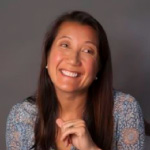Healthy Sexuality Education

I became the “consent lady” by default. A health educator for 25 years, I value all aspects of wellness–sex education included. While developing the Health program at the Urban School in San Francisco, my colleague and fellow health education teacher, Jenn, and I were both juggling parenting commitments and child care, and trying to create a schedule that worked for both of us. We divided up our classes and, almost by chance, my teaching focus became healthy sexuality and personal integrity for sophomores.
Since then, we’ve developed an innovative four-year health program that is harm reductive, sex-positive, inclusive of a vast number of topics, comprehensive, and developmentally appropriate. When an Urban parent, who founded a company that distributes documentary films for education, suggested to the directors of the Hunting Ground (a documentary about sexual assault on college campuses) that I write the curriculum guide for the film, I had no idea what it would lead to.
Today I have a national consulting business that addresses K-8 wellness, specializing in healthy sexuality education. I’ve also written a book on adolescents and sex, due out in September, called Sex, Teens, and Everything In Between.
What I’ve discovered is that there are many others who believe in this work: promoting the well being of our students, sexuality being a key component. This was affirmed ten-fold at the CATDC’s Sexuality Education Summit in June. It was like attending my version of Outside Lands (a popular three day concert held in San Francisco every August that draws an annual crowd of about 200,000). We didn’t quite have 200,000 in attendance but the passion, enthusiasm, and celebratory spirit created a similar feeling of euphoria and hope for the future—all produced and executed beautifully by Sarah Huss of Campbell Hall and Dana Gonzalez of Brentwood School, and sponsored by the CATDC.
Five Nurturing Needs
Debbie Roffman, the iconic sexuality educator and author, opened the first day of the conference with an invitation to be a part of a movement that encourages “sexual well-being education” by putting children, not sex, at the center of our work. If you’ve had the opportunity to hear Debbie talk about childhood notions of sexuality, you know what I mean when I say you will be taken on a journey that is joyful, logical, compelling, and commonsensical—peppered with hilarity and tied together with a sense of purpose. Ultimately, it all comes down to five, child-centered nurturing needs:
- Affirmation
- Information
- Clarity about values
- Limit setting
- Anticipatory guidance
These are all needs that a quality education should meet. To get there, I think it’s essential to ask the following questions: What foundation have we created for this “whole child” teaching? How are we scaffolding the lifelong learning that is essential to our growing students’ well-being? How do we empower young students with the language of body autonomy, and normalize emerging sexuality in ways that lead to acceptance and inclusion? What will we hang on that scaffolding that will prepare them to navigate puberty and sexual discovery as they journey through adolescence? And, finally, will that scaffolding ultimately prepare them to navigate the sexual landscape of young adulthood in college and beyond? Because how we understand ourselves and treat each other matters, and that includes the context of sexuality.
Moving into Adolescence
Michael Riera, nationally renowned psychologist, parenting expert, head of school and author, shared his signature developmental framework that speaks exactly to teenage needs and the factors that influence teen development: bodies, thinking brains, social emotional lives, identity, family, and trauma. I had the good fortune to collaborate with Mike in the afternoon of the summit’s opening day, to discuss these developmentally significant topics within the context of sexuality. This meant a lot to me since he was my first mentor twenty years ago when I transitioned from social work to teaching.
Our presentation explored difficult questions, including: How can we encourage teens to have a positive relationship with their constantly changing and unpredictable bodies when it’s often difficult to trust them? If teen brains are neuroplastic, what can we do to encourage positive “practices” and behaviors that lead to better decision making, especially in regard to romantic and/or sexual exploration? Since teens are neurologically programmed to seek the acceptance of their peers, how can we help them navigate decisions around sex in a way that honors their individual, family, and community values? And, finally, how do family dynamics and the challenges they present factor into who teens become, how they manage adversity, and the choices they make?
Drilling Down on Consent
Day two of our summit was rich with various workshops by a tremendous group of dedicated teachers. I offered workshops on consent and love. My workshops typically mirror what I teach my students. First, consent information: what definitions and legal responsibilities are essential. And second, consent education: guidance on how to apply that information to the dynamics and complexities of human relationships.
At the end of one workshop, as particpants were filing out of the room, a middle school sex educator who contracts with schools to teach puberty education workshops approached me. If I could only teach five essential concepts about consent, she asked, what they would be. This question actually got the attention of several lingering participants. In a nutshell, I explained, the five concepts are: healthy vulnerability as courage, not weakness; what empathy looks, sounds, and feels like in practice; sexual exploration as a felt experience vs. a performance; how to initiate, build and nurture authentic connection and intimacy; and how to connect one’s intuition and individual sense of readiness to the embodied experience of relationships. Of course, many of these concepts go far beyond the legal definition and responsibilities of consent, because, really, consent is a pretty low bar when it comes to a positive, satisfying, and enriching sexual experience. In my workshop I pointed out that we need to teach beyond consent, so that our students begin to understand the importance of balancing responsibility with pleasure. This shifted our conversation to what, ultimately, is a healthy, sexual relationship. We all agreed that it’s one that enriches our lives and is good and satisfying, which is, of course, easier to define than achieve, for adults and teens alike.
Embracing Love
People often ask me what we should encourage our students to aspire to in their relationships? The answer is simple: Love.
“The Talk”, a 2017 study conducted by Making Caring Common at the Harvard Graduate School of Education, found that young people are poorly prepared to have caring and loving relationships because the adults in their lives fail to talk to them about love. Many are well meaning and address the topics of safe sexuality practices, but neglect to discuss the basics of caring, loving relationships. So I make it my goal as a teacher to help students figure out what we can about love in all it’s different forms and manifestations.
I find young people eat this up and are deeply curious about love’s mysteries. In my workshop at the summit, I talked about my six-week class, which follows the life line of a romantic relationship. As a class we get together, fall in love, go through a break up, and come out the other side. I shared that we open the session on Love in Week Six with a quote by Leo Tolstoy: “I think… if it is true that there are as many minds as there are heads, then there are as many kinds of love as there are hearts.” To begin this section, we delve deep into music and create a class playlist. What songs are about infatuation? Which about love? How do we know and is it our criteria to tell the difference? Then we engage in “Love Interviews.” Students jump at the chance, now emboldened with a reason, to ask parents, grandparents, friends, family, and others about their experience of love. The discovery, the fall, the joy, the reality, the pain, and the power of new love, unrequited love, mature and everlasting love—how it may ebb and flow over time to evolve or devolve into experience that has the power to change us forever. At the end of the workshop, after questions, meaningful discussion, personal and professional sharing which inspired empathy and reflection, we all felt the joy of our shared experience. There was love in the room. A love that we all committed to conjuring more of in our classrooms and with each other.
In Concert Together
On the last night of Outside Lands, my 17 year old daughter and her friends sat in our kitchen at while I made them a late-night snack. They were enthralled by their shared experience of music that resonated with their adolescent lives, the excitement and joy inspired by the community celebrating the creativity and artistry of the musicians. Meanwhile, the CATDC is already orchestrating it’s next Sexuality Education Summit—my Outside Lands—where we’ve created a community of people from diverse backgrounds and institutions to develop and sustain this mission-driven work. I hope to see you there.

Shafia Zaloom is currently a Health Educator at the Urban School in San Francisco. A teacher, former coach, certified outdoor educator and administrator in the Bay Area for 25 years, she has worked with thousands of teenagers. The focus of Shafia’s work is on human development, healthy communities, ethics and social justice. She consults with other schools to create programs and leads teachers to develop and present curricula on a variety of topics. Committed to service, Shafia has been on six educational nonprofit boards and honored by the San Francisco Giants with the Isabelle Lemon Community Spirit Award of 2018 for her work with Aim High, a program that expands opportunities for students from low-income neighborhoods and their teachers through tuition-free summer learning enrichment.
